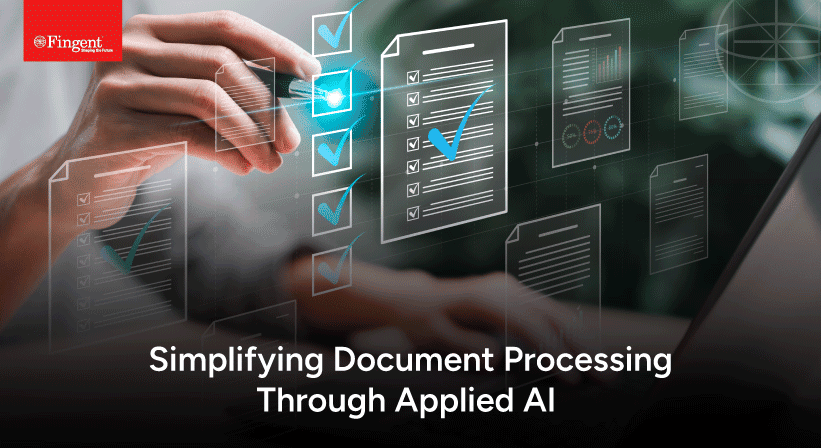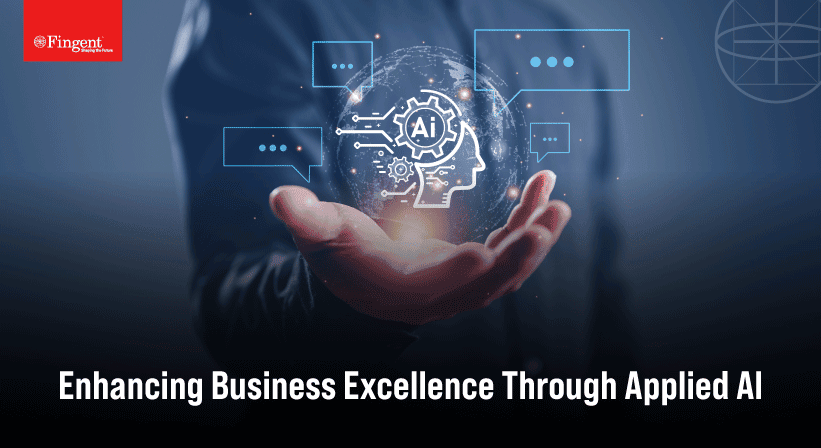Artificial Intelligence in Medicine: Yesterday, Today, and Tomorrow
Warning: in_array() expects parameter 2 to be array, null given in /home/www/fingenttest/public/wp-content/themes/fingent/template-parts/content.php on line 37
Warning: in_array() expects parameter 2 to be array, null given in /home/www/fingenttest/public/wp-content/themes/fingent/template-parts/content.php on line 81
How is AI Facilitating Healthcare Innovation Over Years
Today Artificial Intelligence (AI) is being used to enhance and improve all spheres of our lives. Artificial Intelligence in medicine is truly life-altering. The technology is used to solve complex healthcare challenges today. AI in medicine helps interpret the data obtained by diagnosing several chronic diseases such as diabetes, cardiovascular diseases, Alzheimer’s, and cancer. Automated systems, tools, and algorithms allow healthcare professionals to minimize errors and control disease progression.
Artificial Intelligence in medicine has considerably advanced two fields: diagnosis and clinical decision-making. The implementation of AI in medicine enables physicians to minimize intra-observer variability and inter-observer variability. It facilitates the interpretation of diagnostic results with high accuracy and speed.
A real-life example: Chest X-rays are among the most common imaging modalities read and interpreted by radiologists in hospitals today. Despite their widespread use, the modalities are difficult to interpret due to their low resolution. The AI models developed by IBM Research Center in California can read X-rays, and their performance is at par with the resident radiologists.
This blog explains how Artificial Intelligence in medicine has been transforming healthcare in the past and present and how it can benefit us in the future.
Read more: Innovative Ways To Leverage Patient-Generated Health Data
How AI has transformed healthcare in the past
In the past, Artificial Intelligence focused primarily on the development of computerized machines that were capable of making inferences or decisions that only humans can make. In 1966, Shakey- “the first electronic person” was developed. It was a mobile robot capable of interpreting instructions. Unfortunately, reduced funding and lack of interest pushed Artificial Intelligence in the medical industry into a phase popularly referred to as “AI winter.” Thankfully, that was not the end.
How is AI transforming the present
Artificial Intelligence in medicine has crossed numerous milestones after the bleak “AI winter.” The present generation has witnessed a paradigm shift across patient treatment, clinical diagnosis, and decision-making. Armed with large amounts of data, doctors are now more capable of providing effective treatment to their patients. AI has revamped analytic methods and changed clinical decision-making techniques.
Read more: 7 Major Impacts of Technology in Healthcare
Increased data volumes enable decision-makers to gain unparalleled insights in all stages of treatment, such as diagnosis, treatment variability, care process, and patient outcomes. According to an analysis by Accenture, Artificial Intelligence in medicine can save 150 billion dollars for the US economy by 2026!
Here’s how AI is transforming medicine and improving patient outcomes.
1. Electronic health records
A CDC survey revealed that nearly 75% of healthcare providers trusted their EHR to improve patient care. AI can make the existing EHR system more intelligent and flexible. AI can improve data discovery and personalize treatment recommendations.
When used with virtual medical assistants, a practitioner can retrieve information from EHRs without becoming a victim of clinical burnout. Thus, AI in EHR can improve both clinical outcomes and clinicians’ quality of life.
2. Medical imaging diagnostics
Medical imaging developers have discovered numerous ways to use Artificial Intelligence in medicine to detect and diagnose a wide range of diseases. These developments range from automating workflows to improving processing speed.
While AI imaging may seem expensive, it saves a vast amount of capital spent on invasive disease treatment and prolonged hospital stays by detecting the disease at an early stage. Ai also improves the accuracy of screenings for conditions by helping doctors in early diagnosis. The advent of molecular imaging allows doctors to diagnose an ailment at the cellular level leading to accurate treatment, better patient outcomes, and decreased mortality and morbidity.
3. Virtual health assistance
Virtual health assistance enhances outcomes by cutting short hospital stays, reducing readmission rates, and improving the patient experience, especially among chronically ill patients. Combining AI with healthcare wearables helps streamline telemedicine and improve patient outcomes.
A Virtual Health Assistant is developed to manage chronic diseases. It collects information about a patient every time he/she visits a doctor. It can be programmed to perform health screenings and send the results to the doctor. Each healthcare facility may choose to have a tailored virtual health strategy. This will help integrate appropriate healthcare platforms and technologies into the delivery model.
4. Proactive medical care
Conventional medical treatment involved treating the patient after detecting the disease. This was called ‘reactive medical care.’ Thankfully, AI brought in a significant shift turning reactive medical care into ‘proactive medical care.’ AI-enabled proactive medical care includes studying patients’ medical history to locate high-risk markets for various diseases. Then they are monitored for any changes. Once an alarming change is detected, the application suggests medical intervention.
These apps encourage the patient to be an active participant in their personal healthcare. These can be extremely helpful or even life-saving in conditions such as palliative care, congenital heart disease, and diabetes management. Such proactive medical care enables the patient to take care of oneself’s daily routine, including emergencies.
Read more: The Application and Impact of Information Technology in Healthcare
Future of AI in medical industry
The journey of Artificial Intelligence in the medical industry has just begun. It has significantly changed patient experience, clinicians’ practice, and pharmaceuticals. AI has found its way from our smartwatches to the supply chain. The future of AI in medicine includes everything from answering the phone to therapeutic drug and device design, making clinical diagnoses and treatment plans, and even conversing with patients. Here are two examples:
1. Drug discovery
AI solutions for the medical industry can identify new potential therapies from vast information available on existing medicines. These will help healthcare providers in redesigning treatments that target new threats such as the Coronavirus. AI can improve the efficiency and success rate of drug development. It can also accelerate the process in response to deadly disease threats.
A report by PwC states that the healthcare and pharma sectors are experiencing 67% improvement in clinical trials and drug discovery with the help of AI.
Listed below are a few examples of how AI handholds frontline workers in the battle against Coronavirus pandemic:
- AI-enabled contactless and wireless thermal scanning devices designed to collect and store precise temperature data of individuals. Care providers can integrate this data into healthcare platforms for further analysis.
- AI-based computer vision programs that can be integrated into drones and CCTV cameras installed in public places to monitor the adherence of the public to COVID safety protocols. It can send real-time alerts to police and public health departments in case of safety violations.
- AI-based robots that help physicians and healthcare workers with patient screening to avoid the risk of virus exposure. It can also enable video conversations with medical experts to procure prescriptions.
- Customized AI applications that help predict COVID-19 symptoms through sample screening. AI also helps in predicting COVID risk scores.
2. Primary care
Multiple organizations are working on ‘direct to patient solutions’ offering advice through voice or chat-based interaction. This can enable patients to receive quick, scalable access for their medical issues minimizing unnecessary trips to the healthcare facility. Healthcare providers should use AI-based direct-to-patient solutions to provide essential guidance for patients in remote geographies of the world.
Artificial Intelligence is revolutionizing the medical industry
Artificial intelligence in medicine is changing the role of doctors and medical professionals. It is also helping patients improve personal health management. AI is here to grow and transform numerous aspects like diagnosis, decision-making, treatment plan, drug development, etc. AI can play a leading role in how the future medical industry operates, ensuring optimal patient outcomes.
Fingent keeps a close eye on the happenings in the medical industry and has developed the necessary capabilities to enable a connected healthcare ecosystem for our clients by developing advanced, end-to-end digital solutions.
Give us a call, and let’s discuss your digital needs.
Stay up to date on what's new

Recommended Posts

08 May 2024 Financial Services B2B
AI Shaping the Future of Financial Services: Use Cases & Applications
As Dan Schulman, the CEO of PayPal once said, “We're not trying to reinvent the wheel; we're trying to perfect it.” Achieving perfection is no easy process. It is not……

24 Apr 2024 B2B
A Leader’s Blueprint for AI Success
"Leaders, embrace AI! Make it your superpower!" - Robert Barber, Leadership Development Trainer and Executive Coach. How Are Businesses Using AI? The verdict is crystal clear—leaders today must embrace AI to……

18 Apr 2024 B2B
Applied AI For Document Processing
"It's becoming increasingly clear that AI is the future, and almost everything else is a sideshow." - World-renowned computer scientist Geoff Hinton AI has taken over almost every aspect of……

21 Feb 2024 B2B
Stepping The AI Revolution with Applied AI
“I am telling you, the world’s first ‘trillionaires’ are going to come from somebody who masters AI and all its derivatives and applies it in ways we never thought of.”……
Featured Blogs
Stay up to date on
what's new


















 US
US Insurance
Insurance









































